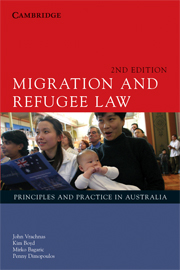Book contents
- Frontmatter
- Contents
- Table of cases
- Table of statutes
- Preface to the second edition
- Acknowledgments
- 1 Historical context to migration
- 2 Immigration control: an overview
- 3 Basic migration legislation and policy
- 4 The visa system and application procedures
- 5 Family and interdependency migration and other Australia-based visas
- 6 Business and investment visas
- 7 Skill-based visas
- 8 Temporary visas
- 9 Miscellaneous visas
- 10 Common visa requirements
- 11 Compliance: unlawful non-citizens, removal and deportation
- 12 History of the refugees convention and definitional framework
- 13 Refugee and humanitarian visas: the statutory structure
- 14 Convention grounds
- 15 Persecution
- 16 Well-founded fear of persecution
- 17 Limits on protection of refugees – cessation, exclusion exceptions and protection by another country
- 18 Time for a fundamental re-think: need as the criterion for assistance
- 19 The determination and review process for migration and refugee decisions
- Index
10 - Common visa requirements
Published online by Cambridge University Press: 05 June 2012
- Frontmatter
- Contents
- Table of cases
- Table of statutes
- Preface to the second edition
- Acknowledgments
- 1 Historical context to migration
- 2 Immigration control: an overview
- 3 Basic migration legislation and policy
- 4 The visa system and application procedures
- 5 Family and interdependency migration and other Australia-based visas
- 6 Business and investment visas
- 7 Skill-based visas
- 8 Temporary visas
- 9 Miscellaneous visas
- 10 Common visa requirements
- 11 Compliance: unlawful non-citizens, removal and deportation
- 12 History of the refugees convention and definitional framework
- 13 Refugee and humanitarian visas: the statutory structure
- 14 Convention grounds
- 15 Persecution
- 16 Well-founded fear of persecution
- 17 Limits on protection of refugees – cessation, exclusion exceptions and protection by another country
- 18 Time for a fundamental re-think: need as the criterion for assistance
- 19 The determination and review process for migration and refugee decisions
- Index
Summary
Overview
Many visa applicants require a sponsor or nominator and, for many visas, there is a requirement for an assurance of support and/or a social security bond. Nearly all visas have requirements related to members of the family unit of the primary applicant, called ‘secondary criteria’ in Schedule 2, even though, in some cases, those ‘secondary’ people are not included in the visa application. Common to all people who have already made a visa application in Australia, they may be refused a second opportunity to make an application. Those matters are canvassed in chapter 4.
Most visas have application charges and several of the permanent visas require those payments to be made in two instalments. The second instalment might include a health charge or payment for English language classes. Those payments are set out in the relevant visa class in Schedule 1.
Criteria related to the health and character of visa applicants are included in all of the prescribed Schedule 2 visas and are commonly known as the public interest criteria (PIC). Failure to meet those criteria will usually result in an application being refused, notwithstanding that the applicant may have met the signature criterion (for instance, establishes a genuine marriage in an application for a spouse visa). An exception is for protection visa applicants, who do not have to ‘pass’ the health test, but still have to be assessed.
- Type
- Chapter
- Information
- Migration and Refugee LawPrinciples and Practice in Australia, pp. 150 - 158Publisher: Cambridge University PressPrint publication year: 2008



